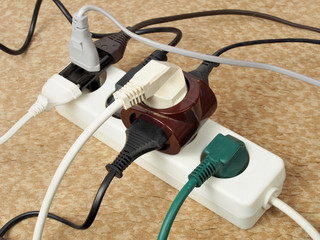
Can You Plug Washing Machine to Extension Cord?
You just moved into a new place, or maybe you are rearranging your house. You choose the ideal layout for your laundry room and decide where the perfect place to put your new washing machine will be.
But when you get it in place, you realize it is too far away from the outlet to plug it in. You have an idea. Can you plug a washing machine into an extension cord?
While you can plug most small appliances into an extension cord with no issues, you should think twice before doing so for a washing machine. The thin wire cannot stand up to the power most washing machines require, resulting in a voltage drop. Water splashing is also dangerous.
Extension cords are lifesavers. They allow us to move more freely without being tied down to the location of our power outlets. But while extension cords are fine for most household items and small appliances, they are not the best choice for something the size of a washing machine.
Why Shouldn’t You Plug Washing Machine Into Extension Cord?
Large appliances such as refrigerators and air conditioners are not ideal candidates for extension cords.
The same is true for kitchen appliances that produce heat, such as microwave ovens, air fryers, and slow cookers. Because of the amount of power these devices require there is a danger that an extension cord will overheat and catch fire.
Washing machines do not draw as much electricity as those, making some people believe it is safe to plug them in. However, most washing machine manufacturers state in their instruction manuals not to do it.
There is a risk of damage to your appliances, your home, and even to yourself. What can happen if you use an extension cord with a washing machine?
1. Fire Hazard
Extension cords must be flexible to store easily and move around a lot. Because of that, extension cords have thinner wiring than the typical home outlet. If the device plugged in has a higher wattage than the extension cord’s rating, it could short out and cause a fire.
2. Performance Issues
Because the thin wire cannot stand up to the power most washing machines require, there is a significant voltage drop. If your washing machine cannot draw the power it needs, it will damage the motor. That can also cause the washer to produce a lot of heat, eventually burning it out.
3. Water Splashing
Have you ever noticed that the outlets in your laundry room are not near the floor as they are throughout the rest of your house or apartment? That is because the chance of water leaking onto the floor is higher.
If a seal fails in the tub of your washer, you could suddenly have a lot of water coming out. If the washer is plugged into an extension cord on the floor, there is a serious risk of someone being injured or killed.
What Precautions to Take if You Need to Use an Extension Cord?
Most washing machines are now fully-automatic, meaning the washing and spin-drying occur in the same basin. If you live in an apartment or a dorm, you might have looked at semi-automatic washing machines.
These are smaller than standard washers and typically have two drums for washing and spin-drying. They are do not draw as much electricity, which are safer for an extension cord, provided it is the right kind.
To keep yourself safe from accidental fires or the risk of electrocution, you should exercise some precautions. You should always use a thick extension cord and be sure it only has one appliance plugged into it.
Also, be sure the cord is hung on the wall to keep it off the floor if there is a leak or spill. That will also reduce the risk of someone being injured by tripping over it.
What to Consider in Extension Cord for a Washing Machine
If there is no way to plug your washer into a wall outlet, be sure to buy the right kind. You can’t pick up the most convenient, lowest priced, or makeshift cord. The safety of your family and your home is at stake.
1. Gauge
The thickness of the wire is called the gauge. In this case, the higher gauges are assigned the lowest numbers. When shopping, look for number 12 or number 10. These are heavy and extra heavy-duty gauges.
2. Length
The current carried by an extension cord gets lower the further it travels. Buying shorter cords will make it less likely you will have a voltage drop that could damage your appliance.
3. Wattage
Always check the wattage requirement of your washing machine before choosing an extension cord. If the washer requires more than the cord can provide, you will be risking a fire by using it.
4. Plug Type
If your washing machine comes with a three-pronged plug, one of them is the grounding pin. This feature causes the electricity to travel to the ground if there is a malfunction. You should never remove the grounding pin to make the plug fit a two-prong outlet. If the prong is not there it could electrify the machine itself.
Outdoor extension cords or waterproof ones are the best choices since they are designed with shut-off features if something goes wrong. Also, remember that if your washing machine has a heater in it you should never use an extension cord of any kind on it.
Conclusion
When moving into a new place or doing a home remodel, always try to place your washing machine close enough to an outlet to plug it directly into the wall.
If that is not possible, consider hiring an electrician to install another outlet for you in the place you have chosen. That is the safest option to prevent damage or injury.
If extension cords are necessary, do some research before heading out to buy one. Be sure the one you choose will provide the wattage your washing machine requires.
And always ensure it is protected from coming into contact with water. Following these basic precautions will help you prolong the life of your washer, and keep your family from unnecessary injury.
Related articles:
